外研版英语七年级下册Module 11 Body language Unit 1 They touch noses!单词教学课件+嵌入音频(共20张PPT)
文档属性
| 名称 | 外研版英语七年级下册Module 11 Body language Unit 1 They touch noses!单词教学课件+嵌入音频(共20张PPT) | 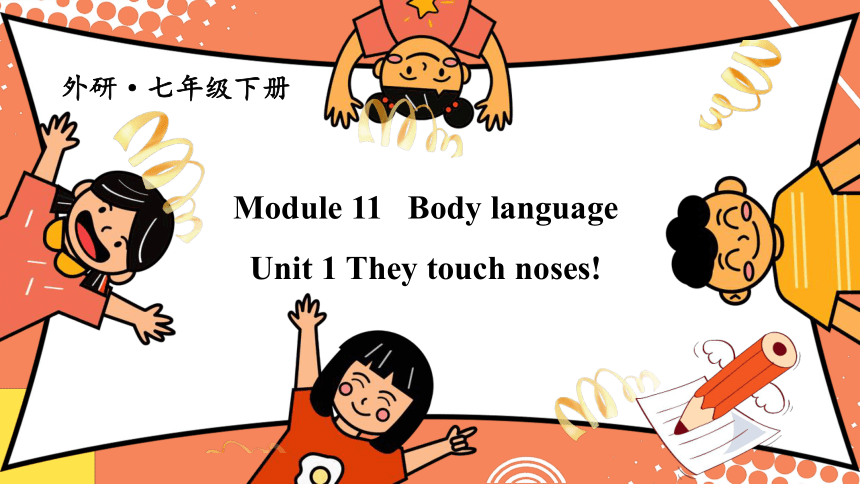 | |
| 格式 | pptx | ||
| 文件大小 | 10.8MB | ||
| 资源类型 | 教案 | ||
| 版本资源 | 外研版 | ||
| 科目 | 英语 | ||
| 更新时间 | 2021-12-26 13:45:40 | ||
图片预览

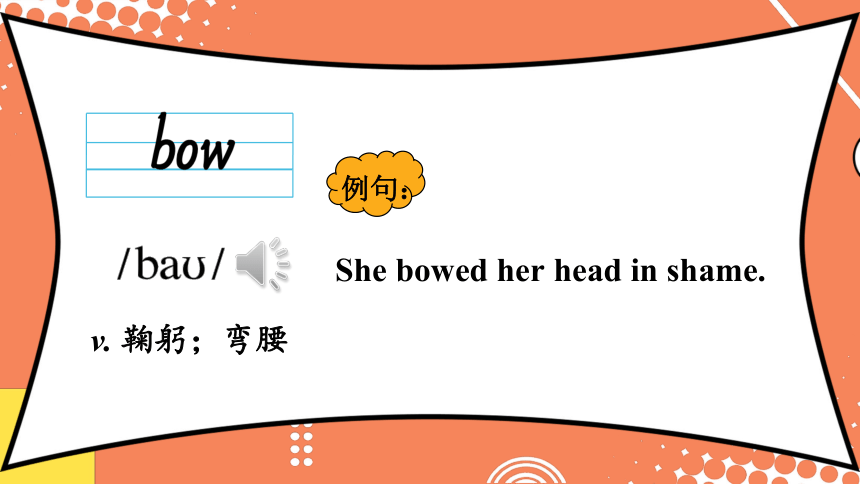
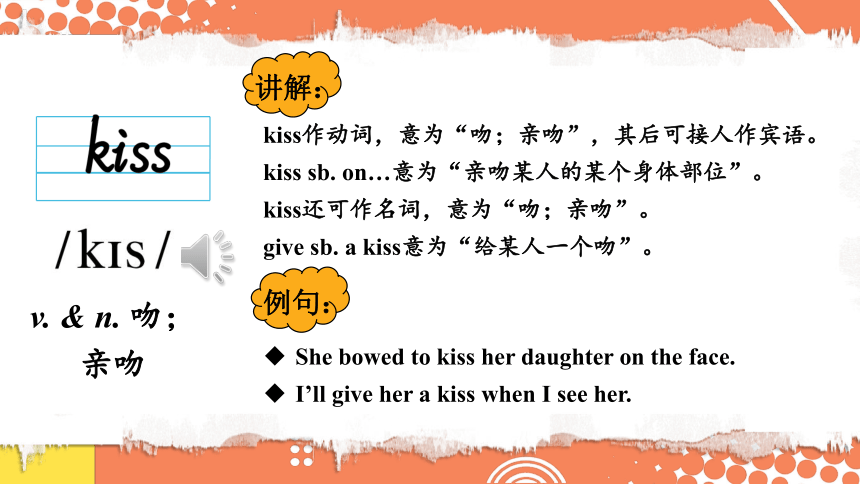
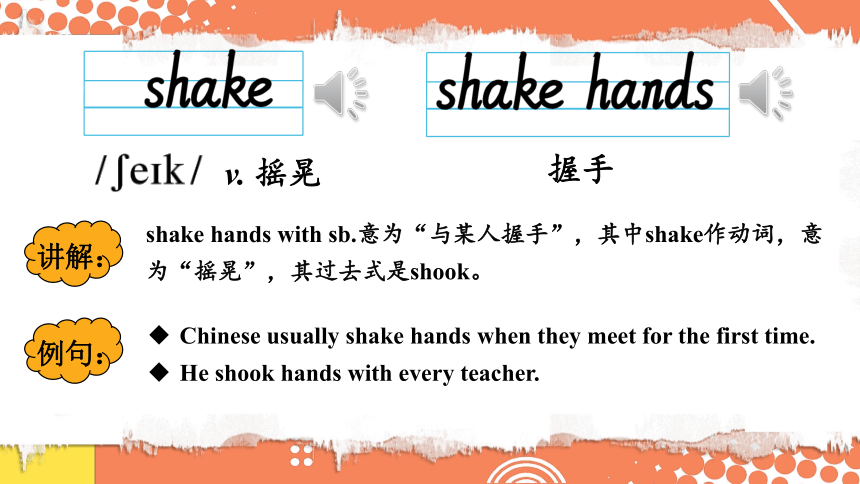
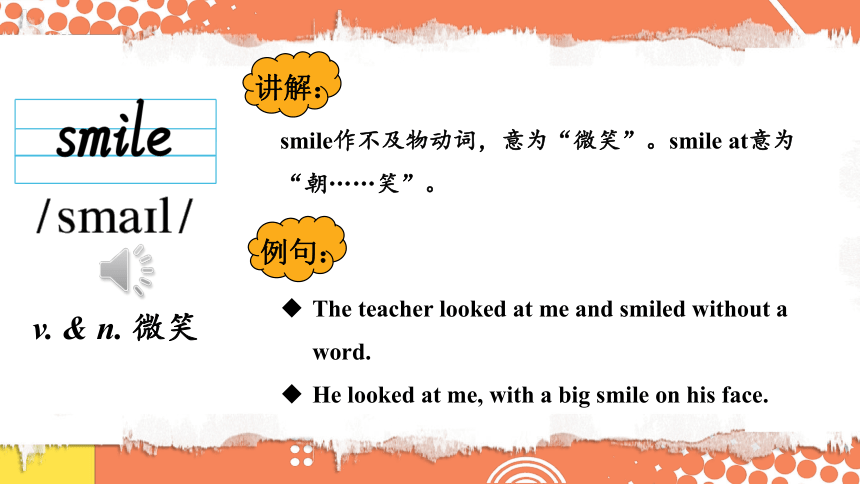
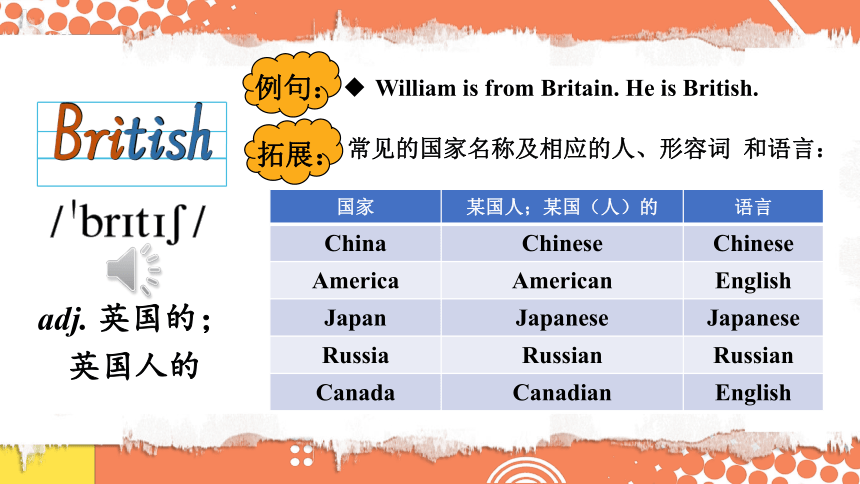
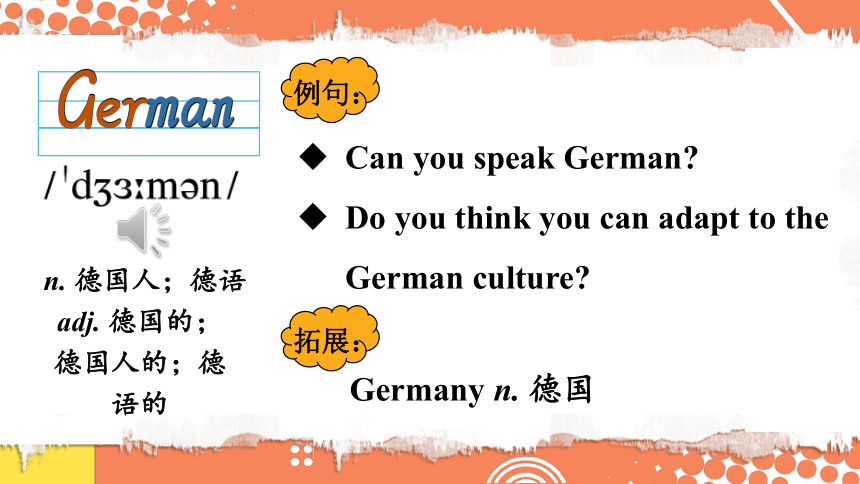
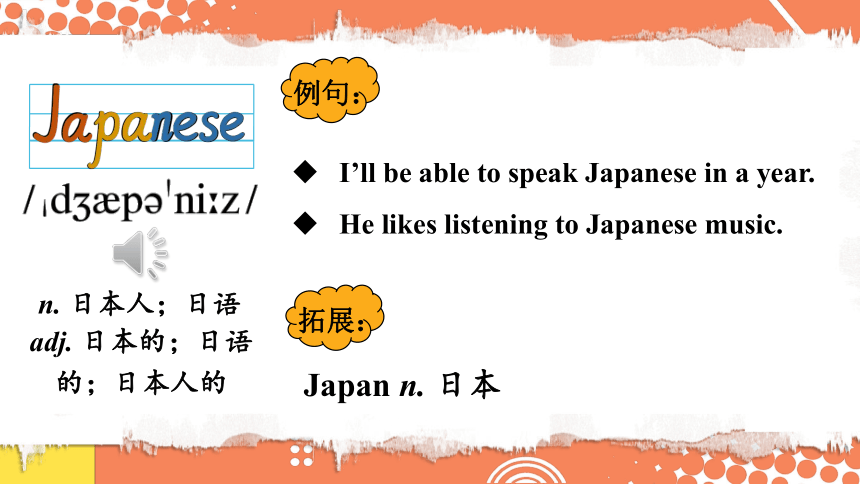
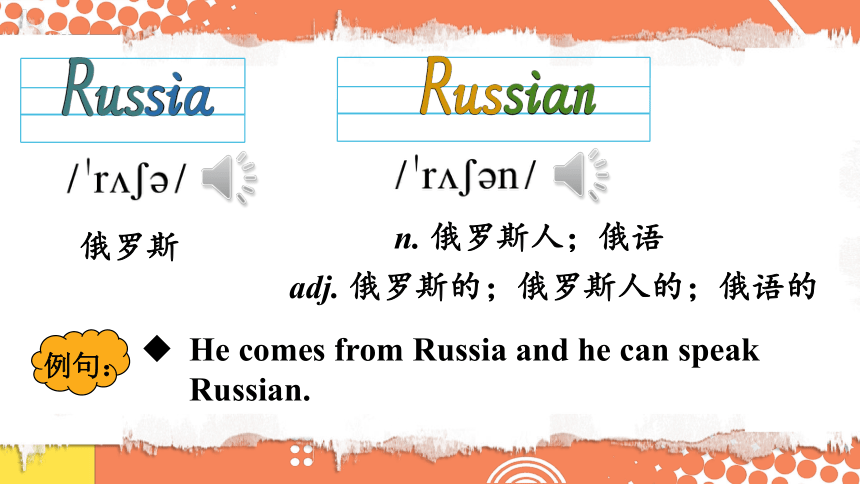
文档简介
(共20张PPT)
Module 11 Body language
Unit 1 They touch noses!
外研·七年级下册
She bowed her head in shame.
v. 鞠躬;弯腰
例句:
v. & n. 吻;亲吻
She bowed to kiss her daughter on the face.
I’ll give her a kiss when I see her.
kiss作动词,意为“吻;亲吻”,其后可接人作宾语。kiss sb. on…意为“亲吻某人的某个身体部位”。
kiss还可作名词,意为“吻;亲吻”。
give sb. a kiss意为“给某人一个吻”。
讲解:
例句:
Chinese usually shake hands when they meet for the first time.
He shook hands with every teacher.
shake hands with sb.意为“与某人握手”,其中shake作动词,意为“摇晃”,其过去式是shook。
v. 摇晃
握手
讲解:
例句:
smile作不及物动词,意为“微笑”。smile at意为“朝……笑”。
The teacher looked at me and smiled without a word.
He looked at me, with a big smile on his face.
v. & n. 微笑
讲解:
例句:
adj. 英国的;英国人的
William is from Britain. He is British.
常见的国家名称及相应的人、形容词 和语言:
国家 某国人;某国(人)的 语言
China Chinese Chinese
America American English
Japan Japanese Japanese
Russia Russian Russian
Canada Canadian English
例句:
拓展:
Can you speak German
Do you think you can adapt to the German culture
Germany n. 德国
n. 德国人;德语
adj. 德国的;德国人的;德语的
例句:
拓展:
n. 日本人;日语
adj. 日本的;日语的;日本人的
I’ll be able to speak Japanese in a year.
He likes listening to Japanese music.
Japan n. 日本
例句:
拓展:
He comes from Russia and he can speak Russian.
俄罗斯
n. 俄罗斯人;俄语
adj. 俄罗斯的;俄罗斯人的;俄语的
例句:
n. 游客;观光者
由“visit(v. 探望;参观)+ 后缀-or”构成
复数形式:visitors
Lots of visitors visit China every year.
常见的“动词+后缀-or”构成的名词:
act(表演)→actor(演员)
invent(发明)→inventor(发明家)
讲解:
例句:
拓展:
—Lingling, you know, in Russia
people usually kiss three times, left,
right, left.
—What! No, I didn’t know that.
what pron. 什么
int. 什么(表示惊奇)
例句:
拓展:
Lingling nodded her head and smiled.
He nodded to me and said “yes”.
过去式为nodded,现在分词为nodding。
nod at/to… 向……点头
nod one’s head 点头
v. 点(头)
讲解:
例句:
head teacher 校长
Raise your hands and arms above your head.
n. 头;头部
例句:
拓展:
They hugged each other.
过去式为hugged,现在分词为hugging。
v. 拥抱;紧抱
hug还可作可数名词,意为“拥抱;搂抱”。
give sb. a hug意为“给某人一个拥抱”。
讲解:
例句:
拓展:
He wrote many plays and each was successful.(作主语)
They each have a watch. (作同位语)
each作代词,意为“各个;每个”,指两者或两者以上中的“每一个”,侧重个体,在句中可作主语、宾语、同位语等。
“each of+可数名词复数/代词复数”作主语时,谓语动词用单数形式。
each还可作限定词,意为“每个;各自”,修饰可数名词单数。
pron. 各个;每个
讲解:
例句:
拓展:
Don’t run after each other in the hallways.
We happen to know each other’s name.
其所有格形式为each other’s。
互相;彼此
讲解:
例句:
In India people put their hands together and nod their heads when they meet.
Indian n. 印度人
adj. 印度(人)的
印度
例句:
拓展:
The glass is in pieces. Let’s put the pieces together.
They usually get together on Spring Festival.
together作副词,意为“一起;共同”,在句中作状语。
put… together意为“把……放在一起”;
get together意为“聚会;聚集”。
adv. 一起;共同
讲解:
例句:
Don’t touch animals in the zoo.
第三人称单数形式为touches。
(1)touch作动词,还可意为“感动;触动”。
The poem touches me.
(2)touch还可作名词,意为“触摸;接触;联系”。
keep in touch with意为“与……保持联系”。
v. 触摸;接触
讲解:
例句:
拓展:
He has small eyes and a small nose. He looks like his mother.
n. 鼻子
例句:
Module 11 Body language
Unit 1 They touch noses!
外研·七年级下册
She bowed her head in shame.
v. 鞠躬;弯腰
例句:
v. & n. 吻;亲吻
She bowed to kiss her daughter on the face.
I’ll give her a kiss when I see her.
kiss作动词,意为“吻;亲吻”,其后可接人作宾语。kiss sb. on…意为“亲吻某人的某个身体部位”。
kiss还可作名词,意为“吻;亲吻”。
give sb. a kiss意为“给某人一个吻”。
讲解:
例句:
Chinese usually shake hands when they meet for the first time.
He shook hands with every teacher.
shake hands with sb.意为“与某人握手”,其中shake作动词,意为“摇晃”,其过去式是shook。
v. 摇晃
握手
讲解:
例句:
smile作不及物动词,意为“微笑”。smile at意为“朝……笑”。
The teacher looked at me and smiled without a word.
He looked at me, with a big smile on his face.
v. & n. 微笑
讲解:
例句:
adj. 英国的;英国人的
William is from Britain. He is British.
常见的国家名称及相应的人、形容词 和语言:
国家 某国人;某国(人)的 语言
China Chinese Chinese
America American English
Japan Japanese Japanese
Russia Russian Russian
Canada Canadian English
例句:
拓展:
Can you speak German
Do you think you can adapt to the German culture
Germany n. 德国
n. 德国人;德语
adj. 德国的;德国人的;德语的
例句:
拓展:
n. 日本人;日语
adj. 日本的;日语的;日本人的
I’ll be able to speak Japanese in a year.
He likes listening to Japanese music.
Japan n. 日本
例句:
拓展:
He comes from Russia and he can speak Russian.
俄罗斯
n. 俄罗斯人;俄语
adj. 俄罗斯的;俄罗斯人的;俄语的
例句:
n. 游客;观光者
由“visit(v. 探望;参观)+ 后缀-or”构成
复数形式:visitors
Lots of visitors visit China every year.
常见的“动词+后缀-or”构成的名词:
act(表演)→actor(演员)
invent(发明)→inventor(发明家)
讲解:
例句:
拓展:
—Lingling, you know, in Russia
people usually kiss three times, left,
right, left.
—What! No, I didn’t know that.
what pron. 什么
int. 什么(表示惊奇)
例句:
拓展:
Lingling nodded her head and smiled.
He nodded to me and said “yes”.
过去式为nodded,现在分词为nodding。
nod at/to… 向……点头
nod one’s head 点头
v. 点(头)
讲解:
例句:
head teacher 校长
Raise your hands and arms above your head.
n. 头;头部
例句:
拓展:
They hugged each other.
过去式为hugged,现在分词为hugging。
v. 拥抱;紧抱
hug还可作可数名词,意为“拥抱;搂抱”。
give sb. a hug意为“给某人一个拥抱”。
讲解:
例句:
拓展:
He wrote many plays and each was successful.(作主语)
They each have a watch. (作同位语)
each作代词,意为“各个;每个”,指两者或两者以上中的“每一个”,侧重个体,在句中可作主语、宾语、同位语等。
“each of+可数名词复数/代词复数”作主语时,谓语动词用单数形式。
each还可作限定词,意为“每个;各自”,修饰可数名词单数。
pron. 各个;每个
讲解:
例句:
拓展:
Don’t run after each other in the hallways.
We happen to know each other’s name.
其所有格形式为each other’s。
互相;彼此
讲解:
例句:
In India people put their hands together and nod their heads when they meet.
Indian n. 印度人
adj. 印度(人)的
印度
例句:
拓展:
The glass is in pieces. Let’s put the pieces together.
They usually get together on Spring Festival.
together作副词,意为“一起;共同”,在句中作状语。
put… together意为“把……放在一起”;
get together意为“聚会;聚集”。
adv. 一起;共同
讲解:
例句:
Don’t touch animals in the zoo.
第三人称单数形式为touches。
(1)touch作动词,还可意为“感动;触动”。
The poem touches me.
(2)touch还可作名词,意为“触摸;接触;联系”。
keep in touch with意为“与……保持联系”。
v. 触摸;接触
讲解:
例句:
拓展:
He has small eyes and a small nose. He looks like his mother.
n. 鼻子
例句:
同课章节目录
- Module 1 Lost and found
- Unit 1 Whose bag is this?
- Unit 2 Are they yours?
- Unit 3 Language in use
- Module 2 What can you do ?
- Unit 1 I can play the piano
- Unit 2 I can run really fast
- Unit 3 Language in use
- Module 3 Making plans
- Unit 1 What are you going to do at the weekends?
- Unit 2 We're going to cheer the players.
- Unit 3 Language in use
- Module 4 Life in the future
- Unit 1 Everyone will study at home
- Unit 2 Every family will have a small plane.
- Unit 3 Language in use
- Module 5 Shopping
- Unit 1 What can I do for you?
- Unit 2 You can buy everything on the Internet
- Unit 3 Language in use
- Module 6 Around town
- Unit 1 Could you tell me how to get to the Nationa
- Unit 2 The London Eye is on your right.
- Unit 3 Language in use
- Revision module A
- Module 7 My past life
- Unit 1 I was born in a small village.
- Unit 2 I was born in Quincy.
- Unit 3 Language in use
- Module 8 Story time
- Unit 1 Once upon a time….
- Unit 2 Goldilocks hurried out of the house.
- Unit 3 Language in use
- Module 9 Life history
- Unit 1 He left school and began work at the age of
- Unit 2 He decided to be an actor.
- Unit 3 Language in use
- Module 10 A holiday journey
- Unit 1 What did you do?
- Unit 2 This morning we took a walk.
- Unit 3 Language in use
- Module 11 Body language
- Unit 1 They touch noses!
- Unit 2 Here are some ways to welcome them.
- Unit 3 Language in use
- Module 12 Western music
- Unit 1 It's so beautiful!
- Unit 2 Vienna is the centre of European classical
- Unit 3 Language in use
- Revision module B
